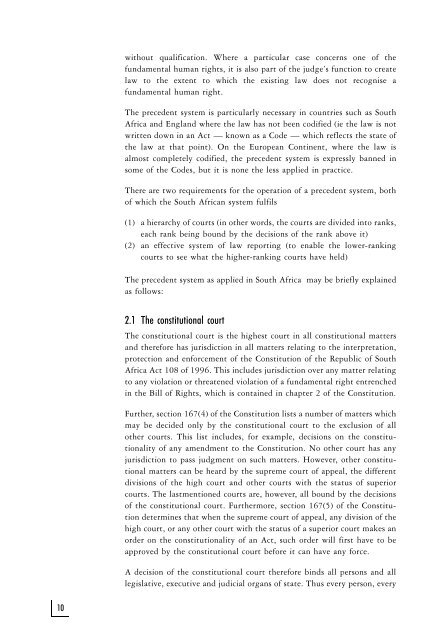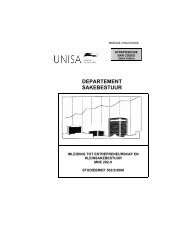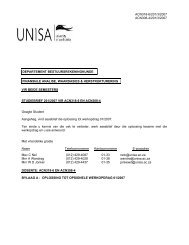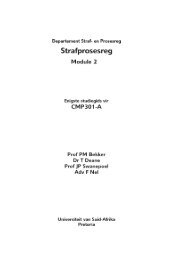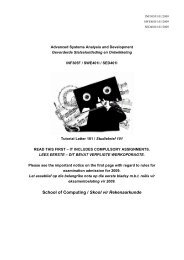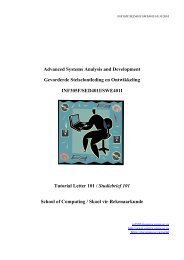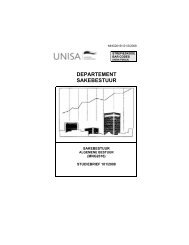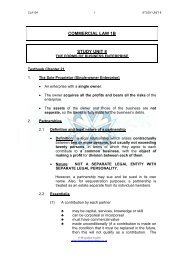key to the study guide - Name
key to the study guide - Name
key to the study guide - Name
Create successful ePaper yourself
Turn your PDF publications into a flip-book with our unique Google optimized e-Paper software.
10<br />
without qualification. Where a particular case concerns one of <strong>the</strong><br />
fundamental human rights, it is also part of <strong>the</strong> judge's function <strong>to</strong> create<br />
law <strong>to</strong> <strong>the</strong> extent <strong>to</strong> which <strong>the</strong> existing law does not recognise a<br />
fundamental human right.<br />
The precedent system is particularly necessary in countries such as South<br />
Africa and England where <strong>the</strong> law has not been codified (ie <strong>the</strong> law is not<br />
written down in an Act Ð known as a Code Ð which reflects <strong>the</strong> state of<br />
<strong>the</strong> law at that point). On <strong>the</strong> European Continent, where <strong>the</strong> law is<br />
almost completely codified, <strong>the</strong> precedent system is expressly banned in<br />
some of <strong>the</strong> Codes, but it is none <strong>the</strong> less applied in practice.<br />
There are two requirements for <strong>the</strong> operation of a precedent system, both<br />
of which <strong>the</strong> South African system fulfils<br />
(1) a hierarchy of courts (in o<strong>the</strong>r words, <strong>the</strong> courts are divided in<strong>to</strong> ranks,<br />
each rank being bound by <strong>the</strong> decisions of <strong>the</strong> rank above it)<br />
(2) an effective system of law reporting (<strong>to</strong> enable <strong>the</strong> lower-ranking<br />
courts <strong>to</strong> see what <strong>the</strong> higher-ranking courts have held)<br />
The precedent system as applied in South Africa may be briefly explained<br />
as follows:<br />
2.1 The constitutional court<br />
The constitutional court is <strong>the</strong> highest court in all constitutional matters<br />
and <strong>the</strong>refore has jurisdiction in all matters relating <strong>to</strong> <strong>the</strong> interpretation,<br />
protection and enforcement of <strong>the</strong> Constitution of <strong>the</strong> Republic of South<br />
Africa Act 108 of 1996. This includes jurisdiction over any matter relating<br />
<strong>to</strong> any violation or threatened violation of a fundamental right entrenched<br />
in <strong>the</strong> Bill of Rights, which is contained in chapter 2 of <strong>the</strong> Constitution.<br />
Fur<strong>the</strong>r, section 167(4) of <strong>the</strong> Constitution lists a number of matters which<br />
may be decided only by <strong>the</strong> constitutional court <strong>to</strong> <strong>the</strong> exclusion of all<br />
o<strong>the</strong>r courts. This list includes, for example, decisions on <strong>the</strong> constitutionality<br />
of any amendment <strong>to</strong> <strong>the</strong> Constitution. No o<strong>the</strong>r court has any<br />
jurisdiction <strong>to</strong> pass judgment on such matters. However, o<strong>the</strong>r constitutional<br />
matters can be heard by <strong>the</strong> supreme court of appeal, <strong>the</strong> different<br />
divisions of <strong>the</strong> high court and o<strong>the</strong>r courts with <strong>the</strong> status of superior<br />
courts. The lastmentioned courts are, however, all bound by <strong>the</strong> decisions<br />
of <strong>the</strong> constitutional court. Fur<strong>the</strong>rmore, section 167(5) of <strong>the</strong> Constitution<br />
determines that when <strong>the</strong> supreme court of appeal, any division of <strong>the</strong><br />
high court, or any o<strong>the</strong>r court with <strong>the</strong> status of a superior court makes an<br />
order on <strong>the</strong> constitutionality of an Act, such order will first have <strong>to</strong> be<br />
approved by <strong>the</strong> constitutional court before it can have any force.<br />
A decision of <strong>the</strong> constitutional court <strong>the</strong>refore binds all persons and all<br />
legislative, executive and judicial organs of state. Thus every person, every


